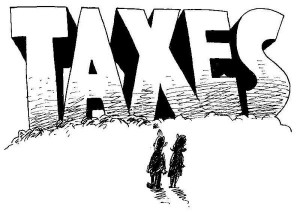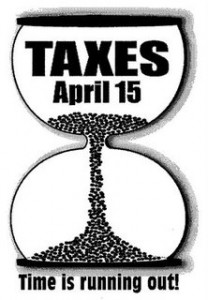Posts Tagged ‘irs’
Posted on: February 11th, 2015 by Amy Bolger
 Even if your overall cash-flow situation is good, but you still need to cover a short-term deficit, today’s still-strict credit environment often won’t allow you to take out a loan. More than likely, your only option would be an untapped home equity line of credit or a generous relative. If that’s the case, great. If not, you may be able to turn to a surprising source for some help: the taxman. Even if your overall cash-flow situation is good, but you still need to cover a short-term deficit, today’s still-strict credit environment often won’t allow you to take out a loan. More than likely, your only option would be an untapped home equity line of credit or a generous relative. If that’s the case, great. If not, you may be able to turn to a surprising source for some help: the taxman.
If you’re self-employed, an investor or someone who lives off Social Security benefits, pension payments, retirement account withdrawals, and the like, you can apply for loan from the Internal Revenue Service. Better yet: To borrow from the IRS, you don’t have to fill out any annoying applications, prove your income or fence with a balky loan officer. While this may sound too good to be true, it is true.
What you do is simply postpone some federal income tax payments that you would otherwise make to the IRS via estimated tax installments. You don’t need the government’s permission. You just do it and then make up the difference later. Of course, the IRS will charge interest on the difference between what you should have paid in for each installment and what you actually paid. However, the current interest rate on estimated tax underpayments is only 3%. While the rate can potentially change each quarter, it will probably remain at a reasonable level for a while.
The IRS calls the interest on estimated tax underpayments a “penalty.” But since the current interest rate is only 3%, it’s not really a penalty. In fact it’s actually a pretty good deal for someone with a short-term cash crisis.
Note: If you are a salaried employee, you must pay in federal income taxes via payroll withholding. You may be able to adjust the withholding downward a bit for the rest of this year by turning in a revised Form W-4 to your employer. However, the strategy of borrowing from the IRS is basically unavailable to you. Sorry.
Estimated Taxes:
There is no federal income tax withholding on income from self-employment activities conducted via sole proprietorships, partnerships, or LLCs. Nor is there generally any required federal income tax withholding on interest income, dividends, capital gains, Social Security benefits, pension payments, or taxable retirement account withdrawals. Instead those with income from these sources are expected to make four installment payments of estimated taxes for each year. The installments for the 2012 tax year are due on Apr. 17, June 15 and Sept. 17 of this year, and Jan. 15 of 2013. Obviously the first date has since passed, but the next three are still in the future. So you can work with the installments due on those dates by paying in less than you owe or even nothing at all.
As mentioned, you will be charged interest based on the difference between the amount you should have paid in for each installment and the amount you actually pay for as long as the underpayment remains outstanding. The amount that you should pay in for each installment generally equals the lesser of: (1) 22.5% of what you expect to report on your 2012 Form 1040 for total federal income and self-employment taxes or (2) 25% of what you reported on your 2011 return (27.5% if your 2011 adjusted gross income was over $150,000).
Borrowing from the IRS in this fashion is only a short-term fix. By no later than April 15th of next year, you must catch up for any estimated tax payment shortfalls for the 2012 tax year. If you don’t, the IRS will start charging additional interest of half a percent per month on the shortfall, which equates to a 6% annual rate. That 6% is on top of the “regular” interest charge, which is currently only 3%. So you could be looking at a rate of 9% or maybe more. In any case, owing the IRS for 2012 taxes after April 15th of next year is just not a good position to be in. So, if you are not ready, willing, and able to pay up by that date, this is not a good option for you. You do not, however have to wait until April 15th to catch up. You can do so as soon as you are able and that is the recommendation.

Tags: estimated taxes, home equity line, home equity line of credit, income tax payments, internal revenue service, irs, linkedin, payroll withholding, pension payments, social security benefits
Posted in CPA Rockvile, Financial Planning Rockville |
No Comments »
Posted on: January 31st, 2015 by Amy Bolger
 The promise to settle all your debts pennies on the dollar sounds like a dream come true for countless consumer and the promise of hundreds of advertisers. Beware. There can be major tax consequences to having your debts forgiven. Once you have your debts canceled, the forgiven balance is considered taxable income on your annual returns. The IRS, unfairly in my opinion, views the forgiven amount as going from a loan you had to repay to income the moment you didn’t have to pay it back. There are certain circumstances in which forgiven debt is not considered income and you should speak to a qualified tax professional to see if you qualify or can qualify for one of these special circumstances. When considering debt forgiveness make sure to consider the effect on your credit score and if it would be the best financial move for you in the long run as well. The promise to settle all your debts pennies on the dollar sounds like a dream come true for countless consumer and the promise of hundreds of advertisers. Beware. There can be major tax consequences to having your debts forgiven. Once you have your debts canceled, the forgiven balance is considered taxable income on your annual returns. The IRS, unfairly in my opinion, views the forgiven amount as going from a loan you had to repay to income the moment you didn’t have to pay it back. There are certain circumstances in which forgiven debt is not considered income and you should speak to a qualified tax professional to see if you qualify or can qualify for one of these special circumstances. When considering debt forgiveness make sure to consider the effect on your credit score and if it would be the best financial move for you in the long run as well.

Tags: debt forgiveness, debt settlement, irs, linkedin, tax professional, taxable income
Posted in CPA Rockvile |
No Comments »
Posted on: February 15th, 2012 by Amy Bolger
 WHEN confronted by a letter from the Internal Revenue Service, some people look at is as though they’ve seen a ghost. BOO! WHEN confronted by a letter from the Internal Revenue Service, some people look at is as though they’ve seen a ghost. BOO!
And when they open certain letters, a few people do see a ghost — or, more accurately, the ghost of a tax return.
When the IRS detects that a person had reportable income but did not file a return, even after much cajoling, it steps in and does the job itself. Based on what it knows, the agency prepares what it calls a “substitute for return”, a Form 1040 (the generic tax return). It lists income, calculates the tax due, adds interest and a penalty for failing to file, and sends the recalcitrant taxpayer a bill based on its efforts.
In one way, that may be a relief to procrastinators who just didn’t get around to filing, perhaps for years. But it often comes at a VERY high price.
Substitute returns are really no substitute for ones that taxpayers could have filed themselves. That’s because the IRS uses data from only the income side when it creates such a return, which means that it doesn’t include all kinds of items that might offset that income, according to Julian Block, a tax lawyer in Larchmont, N.Y.
The IRS works from W-2 reports of wages paid, filed by employers, and reports of payments to self-employed people from companies that used their services. The agency also uses reports from financial institutions about interest and dividends paid and reports from brokers about assets sold. All these things are taxable income.
For self-employed people, in particular, there is often a big disparity between payments received and taxable income, because much of what they receive goes for supplies or salaries or other expenses. But the IRS will know only the gross payment, and will plug that figure into its return. It does not even know about the original cost of assets that were reported sold.
In other words, the IRS does not include many of the deductions to which a non-filer may be entitled. But this doesn’t mean that the IRS is being mean or vengeful or evil.
The IRS is candid that it does not even look for deductions. In a fact sheet in what it calls the “tax gap” series on its Web site, the IRS warns that a substitute return it prepares is a “basic” one that “will not include any of your additional exemptions or expenses.”
The IRS investigates about a million “non-filer situations” a year. But it does not prepare a substitute return for everyone that it believes failed to file. People in the underground economy do not leave a trail that can contribute to such a return, tax experts have been noted as saying. If those people are caught, they may not get an official printout in the mail. A visit from someone who dangles handcuffs from a belt is more likely. And the IRS substitute is not used when a taxpayer has filed a return but the agency believes that he or she failed to report some income. It has other methods for resolving those issues — often an audit… just what we all have time for!
A taxpayer prompted to action by a substitute return can file the return that he or she should have filed in the first place, and the IRS will adjust the taxpayer’s account accordingly. The next step, in which taxpayers can claim their exemptions and deductions, can sharply cut the amount due or even yield a refund. Many nonfilers wouldn’t owe large amounts if their returns were done properly. The IRS fact sheet says its research shows that such failures “could simply be due to procrastination”, as stated by Mr. Eric Bach, CPA.
ONCE a ghost return appears in the mail, simply avoiding it isn’t a viable option. The IRS will send reminders. If there is no response, it will start collection efforts, based on its calculations.
“The worst thing a taxpayer can do, is not file a return and then continue to ignore the repeated letters from the IRS”, Mr. Bach said.
But taxpayers sometimes do just that, provoked by “fear, paralysis, and denial”, as Mr. Bach has stated it. “The most important point to remember is that the substitute returns only reflect the income and some some expense information such as mortgage interest because they are required to be reported to the IRS. These returns are not final. When the actual return is filed, it supercedes the ‘ghost return’. This is very important to remember because the actual return will include your itemized deductions that may substantially reduce the IRS’ original assessment.” In essence, Mr. Bach’s point is, file your returns as quickly as possible if a “ghost return” has been filed to, not only reduce your tax debt and possibly eliminate it, but also to minimize penalties.
Unpleasant as it may be to file a tax return, and paying the bill to begin with… filing may prove much more appealing than the alternatives.

Tags: ghost return, internal revenue service, irs, linkedin, tax lawyer, tax return, taxable income
Posted in CPA Rockvile |
No Comments »
Posted on: January 5th, 2012 by Amy Bolger
 For the second year in a row, the IRS is giving taxpayers two extra days to get their taxes turned in this year. While Tax Day typically falls on April 15, the IRS announced Wednesday that it is pushing back this year’s filing deadline to Tuesday, April 17. For the second year in a row, the IRS is giving taxpayers two extra days to get their taxes turned in this year. While Tax Day typically falls on April 15, the IRS announced Wednesday that it is pushing back this year’s filing deadline to Tuesday, April 17.
The extension was granted because April 15 falls on a Sunday this year, and Monday is Emancipation Day, a holiday in Washington D.C. that celebrates the freeing of slaves in the district. Last year, Tax Day was extended until April 18, also thanks to Emancipation Day.
The IRS will also begin accepting returns submitted online through the agency’s e-filing system, which the IRS says is the fastest, most accurate filing option for taxpayers, on January 17.
If you are requesting an extension, you have until Oct. 15 to file your 2011 tax return, the agency said.
The IRS said it expects to receive more than 144 million individual tax returns this year, with the majority projected to be submitted by the new April 17 deadline.

Tags: e filing, emancipation day, filing system, irs, tax return, taxpayers
Posted in CPA Rockvile |
No Comments »
Posted on: April 5th, 2011 by Amy Bolger
 Americans have tried just about everything to get out of paying their taxes but very few ever work. The IRS recently released its annual The Truth About Frivolous Tax Arguments report, which outlines not only the most popular arguments people have presented over the years to avoid paying their taxes, but also the policy statements and inevitable tax court decisions the government has used to debunk them. “Anyone who contemplates arguing on legal grounds against paying their fair share of taxes should first read the 84-page document,” the IRS said in a statement. Americans have tried just about everything to get out of paying their taxes but very few ever work. The IRS recently released its annual The Truth About Frivolous Tax Arguments report, which outlines not only the most popular arguments people have presented over the years to avoid paying their taxes, but also the policy statements and inevitable tax court decisions the government has used to debunk them. “Anyone who contemplates arguing on legal grounds against paying their fair share of taxes should first read the 84-page document,” the IRS said in a statement.
Taxpayers’ contentions have run the gamut over the years. Whether you’re arguing that you don’t have to pay your taxes based on moral grounds or because only “employees” of the government are subject to federal income tax, though, it’s likely to cost you a significant amount of time and a decent sum of money.
Back in 2006, Congress increased the penalty for frivolous tax returns to $5,000 from $500. The penalty is applied when a person submits a tax return and any portion of the submission is based on a position the IRS identifies as frivolous. Filers typically present forms that indicate they have no income or tax liability, also known as a “zero return.” Their reasons for not paying usually come up in tax court when the filers try to contest an audit or lien.
Contention: Taxpayers can refuse to pay income taxes on religious or moral grounds.
The IRS says taxpayers have frequently used the First Amendment to argue that they don’t have to pay taxes because it is against their moral or religious beliefs, since it says that “Congress shall make no law respecting an establishment of religion, or prohibiting the free exercise thereof; or abridging the freedom of speech, or of the press; or the right of the people peaceably to assemble, and to petition the Government for a redress of grievances.” The Supreme Court has frequently asserted that saying your religious beliefs are in conflict with the payment of taxes provides no basis for refusing to pay, though.
Contention: Paying taxes violates the Fifth Amendment.
The Fifth Amendment to the Constitution says a person shall not be “deprived of life, liberty, or property, without due process of law.” This might sound like a sound argument if the law hadn’t already decided it is well within the government’s rights to charge residents to live here. According to the IRS, the Supreme Court stated in Brushaber v. Union Pacific R.R., 240 U.S. 1, 24 (1916), that “it is … well settled that [the Fifth Amendment] is not a limitation upon the taxing power conferred upon Congress by the Constitution.”
Contention: Taxes are a form of servitude in violation of the 13th Amendment.
Residents have argued that paying taxes is a form of servitude, which is problematic, since the 13th Amendment prohibits slavery (as well as the imposition of involuntary servitude). Courts have consistently found that paying taxes is not considered forced servitude, though, calling the claim “clearly unsubstantial and without merit,” as well as “far-fetched and frivolous.”
Keep in mind that the IRS does have payment plans available for taxpayers who find themselves significantly impaired financially. In fact, the IRS recently made changes to its lien system, the main way the agency penalizes people who can’t pay their taxes on time.

Tags: federal income tax, first amendment, irs, linkedin, tax court decisions, tax liability, twitter
Posted in CPA Rockvile |
No Comments »
Posted on: December 15th, 2010 by Amy Bolger
 Despite the availability and relative ease of using a professional tax preparer, an estimated 40% of Americans do their own taxes. The typical do-it-yourself filer needs about 24 hours to complete the task, according to the IRS. Despite the availability and relative ease of using a professional tax preparer, an estimated 40% of Americans do their own taxes. The typical do-it-yourself filer needs about 24 hours to complete the task, according to the IRS.
At home software is always a helpful tool to use, but no brand is GUARANTEED to be infallible. Thus, it’s important for do-it-yourself filers to keep up as best they can with relevant changes to the tax code as a safeguard against errors in their tax prep software. Here are the 4 most important changes you should know if you are the “do-it-yourselfer”:
1. Smaller Deductions for Business and Medical Mileage
You can’t write off the cost of a daily commute by car, but you can deduct other work-related mileage you’re not reimbursed for (which you have long since been able to do). This year, for example, you’d get 50 cents a mile for driving from, say, DC to New York City and back for a trade show. That’s five cents less per mile than you’d have gotten for the same trip in 2009. The deduction for operating your car for medical reasons is 7.5 cents less than last year as well (16.5 cents per mile in 2010). However, driving for charitable purposes is still deductible at 14 cents per mile, just like last year.
2. Better Limits on Deductions for Property Damage or Loss Due to Theft
For damaged or stolen property to be deductible, the loss amount must now only exceed $100, compared with $500 in 2009. The “10% of AGI” rule still generally applies though. (Remember, AGI <Adjusted Gross Income> is the sum of all your income – such as wages, interest and alimony received – minus certain adjustments, such as IRA contributions, student loan interest you’ve paid and moving expenses.)
3. Deduction for Taxes and Fees on New Motor Vehicle Purchases
Did you buy a new car, light truck, motor home or motorcycle between February 17 and December 31 of 2009? If so, in 2010 you can deduct state, local, and excise taxes related to the purchase. If your state has no sales tax, you can instead deduct other taxes or fees the purchase generated. An interesting feature of this deduction is you can use it to increase your standard deduction or take it as a regular itemized deduction, whichever works out best for you. (See your tax professional for more clarification).
There are a couple limitations to know about. First, the deduction is only good on up to $49,500 of the purchase price. Second, it’s phased out at certain levels of modified adjusted gross income (MAGI) – between $250,000 and $260,000 for joint filers and from $125,000 to $135,000 for other taxpayers. (MAGI is your AGI plus certain deductions such as those for student loans, IRA contributions and higher education costs.)
4. Bigger Deductions for Long-Term Care (LTC) Insurance Premiums
IRS rules allow long term care insurance policy owners to deduct more of their premiums in 2010 than in 2009. For example, those ages 51 to 60 can claim up to $1,230 in LTC insurance premiums this year, compared with $1,190 last year. Similar increases have been approved for other age groups as well: 40 and under, 41-50, 61-70 and 71 or over. At $330, the deduction is smallest for the 40-and-under age group. It rises progressively to a maximum of $4,110 for those ages 71 or over.
To see what other potentially beneficial changes have been made, check out a list called “Tax Changes for Individuals” at the IRS website.

Tags: adjusted gross income, irs, linked, motor vehicle purchases, professional tax preparer, tax prep software
Posted in CPA Rockvile, Financial Planning Rockville |
No Comments »
Posted on: April 15th, 2010 by Amy Bolger
 If you haven’t paid your taxes, the first thing you can expect to receive are notices in the mail along with instructions explaining your rights. Many times the issue can be resolved by filing for an installment plan. If you owe a large balance, however, and refuse to communicate with the IRS, you will eventually face the possibility of having a lien or levy placed on some or all of your property. A federal lien is a public notice that you owe back taxes and allows the IRS to seize any proceeds from the sale of any real estate. This prevents you from selling any property with a clean title until the IRS has been paid in full. Furthermore, the lien follows the property, not the individual, so if someone has the misfortune of buying that property, they will inherit the lien as well and the government now has 2 people to go after. If you haven’t paid your taxes, the first thing you can expect to receive are notices in the mail along with instructions explaining your rights. Many times the issue can be resolved by filing for an installment plan. If you owe a large balance, however, and refuse to communicate with the IRS, you will eventually face the possibility of having a lien or levy placed on some or all of your property. A federal lien is a public notice that you owe back taxes and allows the IRS to seize any proceeds from the sale of any real estate. This prevents you from selling any property with a clean title until the IRS has been paid in full. Furthermore, the lien follows the property, not the individual, so if someone has the misfortune of buying that property, they will inherit the lien as well and the government now has 2 people to go after.
You can appeal a tax lien by filing a “Collection Appeal Request” and the IRS will determine your case within 5 business days. You should also contact the IRS right away to try and convince them that a lien will affect your credit and prevent you from getting loans to pay off the debt. If you have the unfortunate circumstances of liens placed on several properties, you should do your best to convince the IRS that they should lift the lien on one property so you can sell it and pay off the debt.
If the IRS is unable to recover your unpaid taxes via a lien, they will issue a levy against your assets. Tax levy notices are generally issued to the employers and financial institutions of the delinquent taxpayer. Although the IRS has the authority to seize the majority of your assets , they cannot take everything. They can, however, take your automobile unless you are successful in convincing them that you need your car to get to work so you can continue paying taxes. They are also able to seize your residence and some retirement accounts, but they usually will only do this as a last resort. You may also have part of your wages garnished from your paycheck. You can try to head all of this off by having a specialized accountant or tax attorney (or you can go head to head with the IRS yourself) attempt to make an offer in compromise.

Tags: accountant, irs, linkedin, tax lien, unpaid taxes
Posted in CPA Rockvile |
No Comments »
Posted on: April 14th, 2010 by Amy Bolger
 For many people, April is tax refund time; but for others, it brings about very unpleasant thoughts. What would you do if your accountant called you to tell you the results of your processed return and it turns out you owe thousands of dollars you don’t have? Or if you did your own return, how many times can you re-run the numbers? There are possible options you can use to help pay your tax bill. One option available is paying with one or more of your credit cards. This may not be the best option, however, given how high the interest rates are on credit cards. Also, when you pay your taxes with your credit card, you will incur a 2.25-3.93% convenience depending on the third-party company you use. For many people, April is tax refund time; but for others, it brings about very unpleasant thoughts. What would you do if your accountant called you to tell you the results of your processed return and it turns out you owe thousands of dollars you don’t have? Or if you did your own return, how many times can you re-run the numbers? There are possible options you can use to help pay your tax bill. One option available is paying with one or more of your credit cards. This may not be the best option, however, given how high the interest rates are on credit cards. Also, when you pay your taxes with your credit card, you will incur a 2.25-3.93% convenience depending on the third-party company you use.
Another option is to obtain a bank loan. Banks and credit unions offer loans to help consolidate debt secured by your property, but this option may or may not be much better than putting the money on your credit card. A debt consolidation loan may charge between 6-21% APR depending on your credit rating. If you currently have good credit and this tax debacle is a one time thing though, your credit score might be better off if you take out the loan versus racking up a credit card balance with a high interest rate.
Unexpectedly owing money to the IRS, in my humble opinion, definitely counts as an emergency situation. You may want to consider using your savings, your emergency fund to pay off the debt. If you can afford to pay it off from savings, it is best to do so and not incur any further penalties or interest. Any good accountant would tell you the same thing.
There is also the option of selling off investments. But the problem with selling off investments in an emergency situation is that you may have to take a loss. But, if you speak to your accountant about this, there are two positive things that may come of it. The first being that your tax bill is paid off and you are not accruing interest and penalties furthering your debt. The second being that if you have to sell at a loss up to $3000, you can use this to offset any gains from selling appreciated investments in the same year. This will minimize next year’s tax bill. Any losses over $3000 can be carried over to the following year.
You can also contact the IRS about setting up an installment agreement. You will still face penalties and interest while you are paying off the debt, and you’ll need to make the payments in full and on time every month. There is also a fee to setting up the plan, as well as a fee to reinstate the plan if you fail to meet your obligations. One reason you may not want to go this route though is that the government can still file a a Notice of Federal Tax Lien on your property until your debt is paid off, making moving or using your equity near impossible.
The last option is taking out a home equity line of credit if you own a home. Borrowing against your equity is an attractive option because interest rates tend to be low and the interest may be tax deductible. The problem is, if you fail to make payments on the loan, you risk losing your house. The extra interest you may pay by putting it on your credit card may be worth not putting your home at risk.
Don’t feel alone if you fall into this category of owing money to the IRS. Many people find themselves in this position every year, and every year accountants help their clients try to work things out. Weigh out all of your options, sit down with a professional, and determine the most suitable option for your position. But don’t stick your head in the sand like an ostrich and think the problem will just go away; the IRS will eventually come knocking.

Tags: accountant, debt consolidation loan, investments, irs, linkedin, tax refund, twitter
Posted in CPA Rockvile |
No Comments »
Posted on: April 14th, 2010 by Amy Bolger
 The tax clock is ticking. It only has days and hours left on it. You can’t turn it back, but there is a way to hit the snooze for 6 more months. Just ask the IRS for more time to file your return. You’ll be in the good company of more than 10 million people. The IRS has made this much easier for taxpayers in recent years. All you have to do or ask your tax preparer/CPA to do is file Form 4868, Application for Automatic Extension of Time to File, either electronically or by US Mail. Remember, though, that an extension to file is not an extension to pay. If you are going to owe taxes when you finally get your return done, you need to pay the money, or an estimated amount close to it, when you ask for the filing extension. This is very important because if the IRS finds that your estimate is unreasonable, it could invalidate your extension request, subjecting you to non-filing penalties. Also, you will owe interest on any underpayment starting from April 15; and if you underpay by more than 10%, you will be subject to an additional penalty. The tax clock is ticking. It only has days and hours left on it. You can’t turn it back, but there is a way to hit the snooze for 6 more months. Just ask the IRS for more time to file your return. You’ll be in the good company of more than 10 million people. The IRS has made this much easier for taxpayers in recent years. All you have to do or ask your tax preparer/CPA to do is file Form 4868, Application for Automatic Extension of Time to File, either electronically or by US Mail. Remember, though, that an extension to file is not an extension to pay. If you are going to owe taxes when you finally get your return done, you need to pay the money, or an estimated amount close to it, when you ask for the filing extension. This is very important because if the IRS finds that your estimate is unreasonable, it could invalidate your extension request, subjecting you to non-filing penalties. Also, you will owe interest on any underpayment starting from April 15; and if you underpay by more than 10%, you will be subject to an additional penalty.
If you find that your expected tax bill is more than you will be able to afford, you can go ahead and make payment arrangements. When you file your extension, also file Form 9465, seeking an installment payment arrangement. You’ll automatically get up to 3 years to pay the tax balance in monthly installments if the bill is $10,000 or less and you are current with previous years’ taxes. If you need help making these arrangements, you can contact a local accountant to assist you.

Tags: accountant, extension request, irs, linkedin, payment arrangements, tax preparer
Posted in CPA Rockvile |
No Comments »
Posted on: April 12th, 2010 by Amy Bolger
 Some labor-force experts predict that 50% of jobs created in the economic recovery will go to contractors, consultants, or other temporary employees. The reason being, that they can cost up to 30% less than full time staff – good news for employers. Studies conducted by the IRS, however, suggest that thousands of companies may be calling workers “contractors” when they are actually full time employees. Some labor-force experts predict that 50% of jobs created in the economic recovery will go to contractors, consultants, or other temporary employees. The reason being, that they can cost up to 30% less than full time staff – good news for employers. Studies conducted by the IRS, however, suggest that thousands of companies may be calling workers “contractors” when they are actually full time employees.
An independent contractor controls when and how he or she works, rather than taking directives from an employer. By incorrectly classifying workers, businesses get all the advantages of full-time employees, while saving millions of dollars on taxes. This also makes the employee ineligible for worker’s compensation, unemployment insurance, and medical leave. To combat this increasing problem, the IRS is expanding company audits and states are announcing state level initiatives to increase fines and implement criminal sanctions for violating companies.

Tags: company audits, economic recovery, independent contractor, irs, jobs
Posted in CPA Rockvile |
No Comments »
|
|
 Even if your overall cash-flow situation is good, but you still need to cover a short-term deficit, today’s still-strict credit environment often won’t allow you to take out a loan. More than likely, your only option would be an untapped home equity line of credit or a generous relative. If that’s the case, great. If not, you may be able to turn to a surprising source for some help: the taxman.
Even if your overall cash-flow situation is good, but you still need to cover a short-term deficit, today’s still-strict credit environment often won’t allow you to take out a loan. More than likely, your only option would be an untapped home equity line of credit or a generous relative. If that’s the case, great. If not, you may be able to turn to a surprising source for some help: the taxman.









